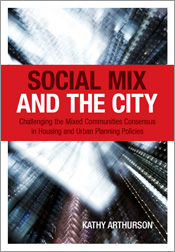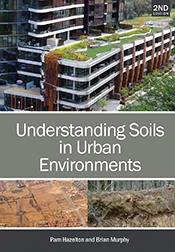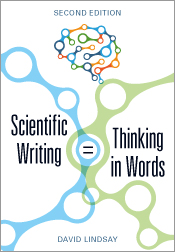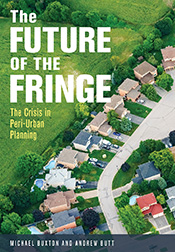Social Mix and the City
Challenging the Mixed Communities Consensus in Housing and Urban Planning Policies
By: Kathy ArthursonCritically appraises how 'social mix' has been constructed historically in urban planning and housing policy.
Concern about rising crime rates, high levels of unemployment and anti-social behaviour of youth gangs within particular urban neighbourhoods has reinvigorated public and community debate into just what makes a functional neighbourhood. The nub of the debate is whether concentrating disadvantaged people together doubly compounds their disadvantage and leads to 'problem neighbourhoods'. This debate has prompted interest by governments in Australia and internationally in 'social mix policies', to disperse the most disadvantaged members of neighbourhoods and create new communities with a blend of residents with a variety of income levels across different housing tenures (public and private rental, home ownership). What is less well acknowledged is that interest in social mix is by no means new, as the concept has informed new town planning policy in Australia, Britain and the US since the post Second World War years. + Full description
Social Mix and the City offers a critical appraisal of different ways that the concept of ‘social mix’ has been constructed historically in urban planning and housing policy, including linking to 'social inclusion'. It investigates why social mix policies re-emerge as a popular policy tool at certain times. It also challenges the contemporary consensus in housing and urban planning policies that social mix is an optimum planning tool – in particular notions about middle class role modelling to integrate problematic residents into more 'acceptable' social behaviours. Importantly, it identifies whether social mix matters or has any real effect from the viewpoint of those affected by the policies – residents where policies have been implemented.
- Short descriptionNews
No longer available in a print edition.
Reviews
"This slim volume is a nicely judged and timely contribution to housing debates. Its stated intent is to unravel the Australian experience of social mix, and it does so in exemplary fashion."
Kate Shaw, Housing, Theory and Society, January 2013
"I commend this book to all interested in planning, housing policy and policy process analysis in general."
Sean Gould, Community Development Journal, December 2012, pp 169
"The links to new literature and the commentary weaved around previously published research are sufficient to make this volume a useful publication for social mix practitioners in Australia. Readers outside Australia may wonder if this book is relevant to them - it is!"
David Manley, Journal of Social Policy, Vol 42, 2013, pp 183-185
"This is one of the best summaries of the literature on social mix and the city that I have read. The book is well written, well structured, for the most part comprehensive, and presents a series of stimulating arguments and debates in an accessible style."
Loretta Lees, International Planning Studies, 17 (4), pp. 421-423, October 2012
"Arthurson's stated aim for her book was 'to challenge the way debates about social mix and disadvantaged neighbourhoods are framed' (p. 3). She has surely succeeded in persuasively doing so and her work merits wide reading amongst academics, students, practitioners and, perhaps above all, policy-makers."
John Flint, Housing Studies, August 2012
"Social Mix and the City is an excellent book for students and researchers in urban studies, planning, geography, sociology and related disciplines... It will also be of interest to policy makers and practitioners working in government, community organizations and those with an interest in seeking to enhance community involvement in urban policy and practice."
Elena Pede, Urban Research & Practice, Vol 5(2), 2012, pp 295-297
Details
ePDF | January 2012ISBN: 9780643104440
Publisher: CSIRO Publishing
Available from eRetailers
ePUB | January 2012
ISBN: 9780643104457
Publisher: CSIRO Publishing
Available from eRetailers
Features
- Provides some alternative insights into social mix
- Examines the historical use and substance of social mix
- Explores questions about the scale of implementation of social mix
- Comprehensively analyses the evidence-base for social mix within the framework of the unique Australian experience
Contents
IntroductionThe origins of the concept of social mix
Post-war debates
Twenty-first century debates: social mix, estate regeneration and social exclusion
Great expectations and the unexpected consequences of social mix policies
Mixed-tenure neighbourhoods reconstituted
Neighbourhood reputation, stigma and social mix
Sense of community, social cohesion and social mix
Conclusions








